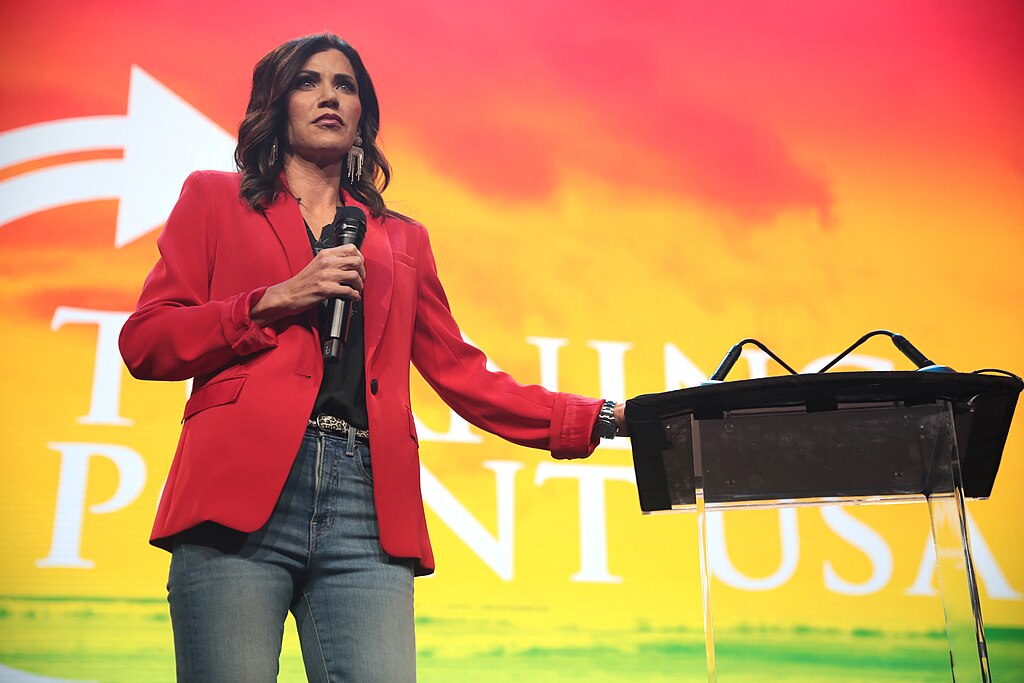
- Details
- By Levi Rickert
Republican South Dakota Governor Kristi Noem, who has been banished from four Indian reservations in her home state, made national news this past weekend when it was disclosed Noem killed a dog she deemed as untrainable for hunting.
The incident received condemnation from Republicans and Democrats alike, as well as animal rights groups.
A contender to be GOP presumptive nominee Donald Trump’s running mate in the upcoming November election, Noem wrote about the incident in her forthcoming memoir, No Going Back: The Truth on What's Wrong with Politics and How We Move America Forward.
The story was first published by The Guardian, which said it obtained a copy of the book that is due out next month. In the book, Noem describes killing “Cricket,” a 14-month wirehaired pointer that Noem writes had an aggressive personality.
Noem deemed Cricket as untrainable to be a hunting dog because she went "out of her mind with excitement” during a pheasant hunting trip. Upon return from the trip, Noem says Cricket killed another family’s chickens. When Noem attempted to stop Cricket Noem was bitten by the dog.
"I hated that dog," Noem writes in the book. The dog was "dangerous to anyone she came in contact with" and "less than worthless" as a hunting dog. "I realized I had to put her down," she continues.
The Guardian does not elaborate on when she actually killed the puppy. The story notes Noem included the incident in her book to demonstrate she has what it takes in politics to do what has to be done, even if it’s “difficult, messy, and ugly.”
As governor of South Dakota, home to nine federally recognized sovereign tribal nations and about 71,000 Native Americans who represent around 8 percent of the state’s population, Noem has maintained a contentious relationship.
In January, Noem was criticized by tribal leaders and tribally enrolled South Dakota lawmakers for comments she made about drugs on South Dakota reservations during a speech to lawmakers about the U.S.-Mexico border. In her speech, Noem implied Mexican drug cartels were being harbored on reservations.
Last month, while speaking at a town meeting in Mitchell, Noem told South Dakotans she wanted to help Native American students, but also took a swipe at Native parents and tribal councils.
“Their kids don’t have any hope,” Noem said. “They don’t have parents who show up and help them. They have a tribal council or a president who focuses on a political agenda more than they care about actually helping somebody’s life look better.”
Tribes throughout the state called Noem’s remarks out for what they were: racism.
More Stories Like This
Native News Weekly (August 25, 2024): D.C. BriefsNavajo Nation Mourns the Passing of Former Vice President Rex Lee Jim
Deb Haaland Earns Endorsement From Communications Workers of America Local 7076
University Soccer Standout Leads by Example
Two Native Americans Named to Democratic Congressional Campaign Committee's“Red to Blue” Program
Help us defend tribal sovereignty.
At Native News Online, our mission is rooted in telling the stories that strengthen sovereignty and uplift Indigenous voices — not just at year’s end, but every single day.
Because of your generosity last year, we were able to keep our reporters on the ground in tribal communities, at national gatherings and in the halls of Congress — covering the issues that matter most to Indian Country: sovereignty, culture, education, health and economic opportunity.
That support sustained us through a tough year in 2025. Now, as we look to the year ahead, we need your help right now to ensure warrior journalism remains strong — reporting that defends tribal sovereignty, amplifies Native truth, and holds power accountable.
 The stakes couldn't be higher. Your support keeps Native voices heard, Native stories told and Native sovereignty defended.
The stakes couldn't be higher. Your support keeps Native voices heard, Native stories told and Native sovereignty defended.
Stand with Warrior Journalism today.
Levi Rickert (Potawatomi), Editor & Publisher

